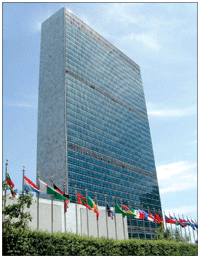
The United Nations building in New York CityDubai lobbies to relocate UN
Dubai has an idea to help fill its vast amount of empty office space: the United Nations. Although it may be a long shot, officials from the United Arab Emirates are making the case that the UN should consider moving its headquarters out of New York City and to Dubai, according to a Bloomberg News report.
The current East Side Manhattan headquarters are undergoing a $1.9 billion renovation, which has temporarily displaced its staff. In a Forbes editorial last month, the magazine argued in favor of the move, noting that the U.S. will be responsible for footing $437 million worth of the renovation bill.
The emirate government of Dubai released a statement last month enumerating the reasons it would be the ideal location for the UN, including proximity to the organization’s priority areas — including Somalia, Iran, Pakistan, Palestine and Israel.
Relocating the UN would also clearly benefit Dubai’s financial landscape. The UN would bring approximately 6,000 staffers to the country, which has faced an epidemic of high office vacancy rates during the downturn. The sheikhdom’s offices are currently around 40 percent unoccupied, and a Colliers International report suggests that the amount of office space in Dubai could double before the end of 2011.
Following brief rally, U.K. housing market takes hit
The United Kingdom’s housing market lost momentum toward the end of 2009, dashing hopes that the market was headed toward long-term residential recovery. Real estate agents reported fewer price increases among listed properties in December than November, according to the Royal Institution of Chartered Surveyors, an independent regulatory professional group. Property values have fallen nearly 20 percent during the recession.
Home prices are poised to fall further, according to industry experts surveyed in the suggestively named British market publication House Price Crash. James Thomas, head of Jones Lang LaSalle’s U.K. residential department, has said that prices will drop by about 7 percent in 2010, while others surveyed were somewhat more optimistic.
Faced with market woes, China mulls property tax
To thwart a possible housing bubble, particularly in high-density cities such as Beijing and Shanghai, Chinese officials are reportedly considering a property tax. The move would be designed to ease the rapidly climbing real estate prices — prices grew in November at the fastest rate since mid-2008, leading some to believe the market could become unstable, according to a report from Property Wire, an online global real estate news Web site.
If approved, it would be the country’s first property tax, according to Bloomberg News. But industry experts say it’s too soon to tell whether the Chinese government would actually impose the tax.
The talk of a property tax comes on the heels of other recent measures to curb inflation in China, including reining in credit and increasing interest rates. Other reports from Chinese news outlets have suggested that the government may also raise the down payment requirements on second homes to as much as 50 percent.
The Chinese State Council released a statement early last month saying it plans to “guide reasonable housing consumption and curb speculative investments” in the coming months.
Compiled by Amy Tennery
